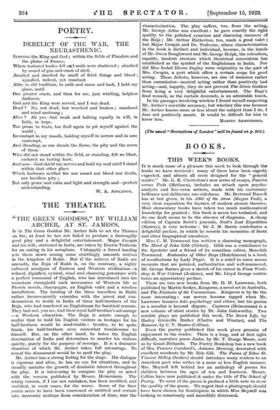THE THEATRE.
"THE GREEN GODDESS," BY WILLIAM ARCHER, AT ST. JAMES'S.
IF in The Green Goddess Mr. Archer fails to set the Thames an fire, at least he has not failed to produce a thoroughly good play and a delightful entertainment. Major Crespin and his wife, stationed in India, are taken by Doctor Traherne for an outing in his aeroplane. Unhappily a forced landing sets them down among some startlingly uncouth natives in the kingdom of Rukh. But if the natives of Ruldi are uncouth, the Raja of Rukh is, on the contrary, a highly cultured amalgam of Eastern and Western civilization—a refined, dignified, cynical, cruel and charming potentate with a perfect command of English, who has introduced into his mountain stronghold such necessaries of Western life as French novels, champagne, an English valet and a wireless installation. The landing of the three travellers in Ruldi rather inconveniently coincides with the arrest and con- demnation to death in India of three half-brothers of the Raja, who had murdered an Englishman for fanatical reasons. They had not, you see, had their royal half-brother's advantage —a Western education. The Raja is astute enough to realize that to hold his English visitors as hostages for his half-brothers would be inadvisable : besides, to be quite frank, his half-brothers were somewhat troublesome to himself. But, on the other hand, he hates the English domination of India and determines to murder his visitors quietly, purely for the purpose of revenge. It is a dramatic situation of which Mr. Archer takes full advantage. To reveal the denouement would be to spoil the play.
Mr. Archer has a strong feeling for the stage. His dialogue is vigorous and alive, he has an eye for situations, and he steadily sustains the growth of dramatic interest throughout the play. It is interesting to compare the play as acted with the version published by Messrs. Heinemann. The leting version, if I am not mistaken, has been modified, and modified, in most cases, for the worse. Some of the finer joints seem to have been coarsened or omitted and certain :uts. necessary Perhaps from consideration of time, mar the characterization. The play suffers, too, from the acting. Mr. George Arliss was excellent : he gave exactly the right quality to the polished cynicism and charming manners og the Raja ; Mr. Arthur Hatherton, too, made a good valet ; but Major Crespin and Dr. Traherne, whose characterization in the book is distinct and individual, became, in the hands of Mr. Owen Roughwood and Mr. George Relph, the colourless, capable, insolent creature which theatrical convention has established as the symbol of the Englishman in India. Nor did Miss Isobel Elsom display more originality in the part of Mrs. Crespin, a part which offers a certain scope for good acting. These defects, however, are sins of omission rather than commission—neutral acting rather than positively bad acting—and, happily, they do not prevent The Green Goddess from being a very delightful entertainment. The Raja's final remark, as the curtain descends, is an admirable touch.
In the passages involving wireless I found myself suspecting Mr. Archer's scientific accuracy, but whether this was because Mr. Archer knows more or less about the subject than I do, I dare not positively assert. It would be difficult for him to


































 Previous page
Previous page